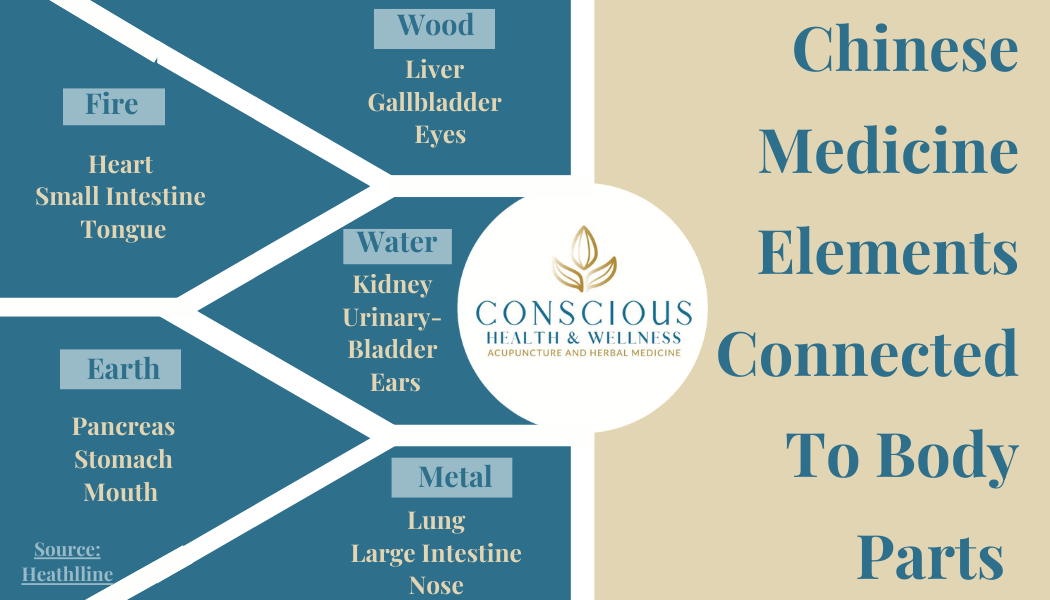How Chinese Medicine Five Elements Relate to Body Organs and Functions
Chinese Medicine operates on the principle that the human body is a microcosm of the natural world, governed by the same elemental forces. In Chinese Medicine, the Five Elements—Wood, Fire, Earth, Metal, and Water—correspond to various organs and body parts, each influencing overall health and balance. Understanding these connections can offer insights into how to maintain harmony and address imbalances in the body. Here’s a closer look at how each element relates to specific organs and body parts.
1. Wood: Liver, Gallbladder, and Eyes
In Chinese Medicine, the Wood element represents growth, flexibility, and renewal. It is linked to the Liver and Gallbladder, as well as the Eyes.
- Liver: The liver is crucial for the smooth flow of Qi (energy) and blood throughout the body. It is responsible for detoxification and emotional regulation. A balanced liver promotes creativity and flexibility, while an imbalance can lead to stress, irritability, and digestive issues.
- Gallbladder: Working in tandem with the liver, the gallbladder stores and excretes bile, aiding in digestion and detoxification. It also plays a role in decision-making and courage.
- Eyes: The health of the eyes is directly related to the liver’s ability to nourish and maintain the clarity of vision. Liver imbalances can manifest as vision problems or eye discomfort.
2. Fire: Heart, Small Intestine, and Tongue
The Fire element symbolizes warmth, transformation, and activity. It governs the Heart, Small Intestine, and Tongue.
- Heart: In Chinese Medicine, the heart is considered the “Emperor” of the body, governing mental and emotional well-being. It houses the mind (Shen) and influences sleep, joy, and clarity of thought. A healthy heart promotes calmness and emotional stability.
- Small Intestine: The small intestine’s role is to separate pure from impure substances, aiding in digestion and nutrient absorption. It works closely with the heart in processing and distributing energy.
- Tongue: The tongue reflects the state of the heart and the overall health of the digestive system. Its color, shape, and coating can provide diagnostic clues about one’s internal balance.
3. Water: Kidney, Urinary Bladder, and Ears
The Water element embodies stillness, preservation, and flow. It is associated with the Kidneys, Urinary Bladder, and Ears.
- Kidneys: The kidneys are foundational to vitality and longevity, storing the essence (Jing) that supports growth and reproduction. They also influence the body’s ability to adapt to stress and maintain fluid balance.
- Urinary Bladder: The bladder stores and excretes urine, regulating fluid metabolism and detoxification. It supports the kidneys by managing the body’s water balance.
- Ears: The health of the ears is linked to the Kidneys. Issues such as hearing loss or tinnitus can indicate kidney imbalances, as the kidneys are believed to nourish the sense of hearing.
4. Earth: Pancreas, Stomach, and Mouth
The Earth element signifies nourishment, stability, and digestion. It is connected to the Pancreas, Stomach, and Mouth.
- Pancreas: In Chinese Medicine, the pancreas is part of the Spleen system and plays a crucial role in transforming food into Qi and blood. It is essential for maintaining energy levels and digestive health.
- Stomach: The stomach is the “rotten and ripen” organ responsible for breaking down food and beginning digestion. It works with the Pancreas to ensure proper nutrient absorption.
- Mouth: The mouth, as the entry point for food and fluids, reflects the health of the stomach and pancreas. Issues like poor appetite or digestive discomfort can be signs of imbalance in the Earth element.
5. Metal: Lung, Large Intestine, and Nose
The Metal element represents structure, clarity, and elimination. It is associated with the Lungs, Large Intestine, and Nose.
- Lungs: The lungs govern respiration and the flow of Qi throughout the body. They also influence the immune system and skin health. A balanced lung function promotes clear breathing and a strong immune response.
- Large Intestine: The large intestine is responsible for the absorption of water and the elimination of waste. It works with the lungs to support detoxification and maintain fluid balance.
- Nose: The nose is closely linked to the lungs. Respiratory issues or nasal congestion can indicate imbalances in the Metal element, reflecting problems with lung function or the elimination process.
Conclusion
In Chinese Medicine, the Five Elements provide a framework for understanding the interconnectedness of our body systems and their influence on overall health. By recognizing how each element correlates with specific organs and body parts, we can gain deeper insights into our well-being and address imbalances more effectively. Embracing this holistic perspective can help in achieving greater harmony and health in our daily lives.
With warm regards and a commitment to holistic well-being,
Miriam Pineles
Dr. Miriam Pineles, DACM

